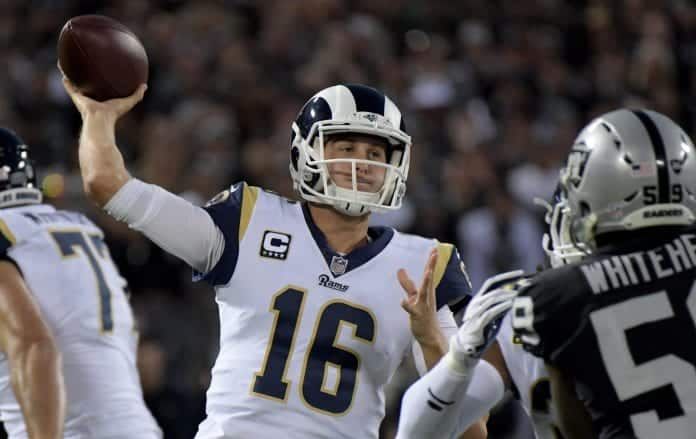The Los Angeles Rams signed Jared Goff to a four-year, $134,000,000 contract extension shortly before the regular season began, hoping that he could improve on an excellent 2018 campaign. Unfortunately, things didn’t go as planned, and 2019 has easily been Goff’s worst year under head coach Sean McVay. Through the first 14 games, he had 17 touchdowns and 15 interceptions, a subpar performance by almost any standard. However, despite his poor play, Goff and the Rams entered Week 16 with their playoff hopes still alive.
If they won their last two games against the San Francisco 49ers and the Arizona Cardinals and got some help from the Minnesota Vikings, they could make the playoffs as a Wild Card team. Unfortunately, their best efforts weren’t quite enough to defeat the 49ers, and that 31-34 loss officially eliminated them from the playoffs. Now, with their season functionally over, Los Angeles is faced with an interesting question: How much of the blame for their failures should be placed on the shoulders of their starting quarterback?
Goff wasn’t awful in Week 16, but he wasn’t good enough
At first glance, Goff’s Week 16 statistics – 323 passing yards, two touchdowns, and one interception – seem decent enough. However, player performances cannot be evaluated using conventional statistics alone. That is why PFN’s Offensive Share Metric (OSM) was created – to help determine how responsible a player was for their own offensive production, as well as how much they contributed to their offense’s success overall, using the NFL’s advanced metrics.
Against San Francisco, Goff received an OSM grade of 22.82. That is higher than his season average of 18.95, but by NFL standards, it is only mediocre at best. A quick look at his advanced metrics reveals why that was the case. Take Goff’s completion percentage as an example. Based on numerous factors, the NFL calculates how likely a quarterback’s throws are to be completed and then uses the results to predict how many passes that quarterback is expected to complete in a game.
Goff’s expected completion percentage was quite low, at 56.3%, but his actual percentage was only 2.4% higher. That differential isn’t bad – in fact, it’s slightly above average. However, it isn’t anything impressive either. The rest of Goff’s metrics follow a similar pattern. None of them are terrible, but they are also far from spectacular.
The picture these statistics paint is pretty clear. In a Week 16 game that the Rams badly needed to win, Goff was pedestrian at best. When you consider the fact that this game graded higher than Goff’s season average, it becomes easy to see why the quarterback has struggled this season. Additionally, if this performance was the best Goff can do with the playoffs on the line, you have to wonder if Los Angeles would be better off moving on from him sooner, rather than later.
Why the Rams might not be eager to get rid of Goff
The obvious counterpoint to arguments suggesting that Los Angeles should find a new franchise quarterback is that, although this season is undeniably disappointing, Goff and McVay achieved great things in their first two seasons together. In those two years, Goff threw 60 touchdowns and only 19 interceptions. More importantly, the Rams had a record of 24-7, won two NFC West titles, and went to a Super Bowl with Goff as their starter during that two-year period.
Does one season of regression really warrant moving on from a young quarterback who has seen that much success early in his career? After all, Goff certainly hasn’t been Los Angeles’ only problem this season. Todd Gurley, a key factor in the Rams’ success under McVay, has been hampered by injury all year, and their defense has been mediocre overall. Ultimately, it will be up to McVay and the front office in Los Angeles to decide whether or not the team can improve in 2020 with Goff at the helm.
Even if the Rams decide that Goff needs to be replaced, actually doing so could prove challenging. His contract included more than $100,000,000 in guaranteed money, which makes cutting him outright an unappealing proposition. Finding a replacement for him in the draft won’t be easy either since Los Angeles lost their 2020 and 2021 first-round picks when they traded for Jalen Ramsey. The Rams might have put themselves in a position where they have no choice but to stick with Goff and hope that he can rebound next season. If he can’t, the franchise had best prepare for another year of suffering in 2020.

